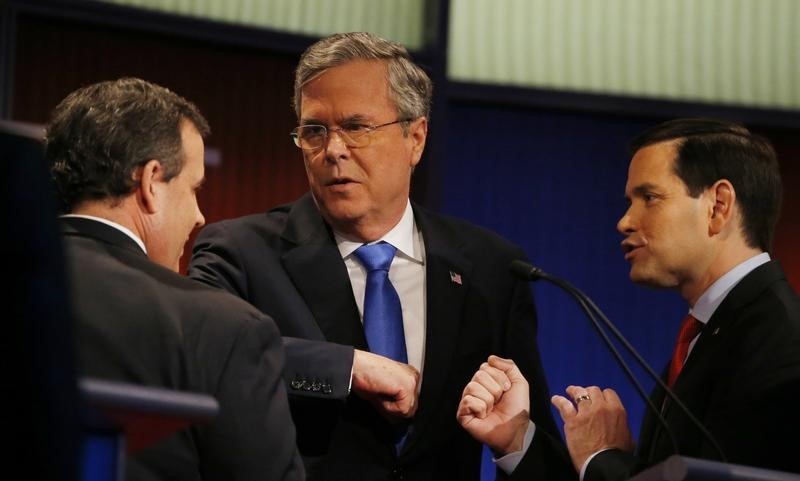By James Oliphant
DES MOINES, Iowa (Reuters) - As seven Republican presidential contenders squared off here for the final debate before voters begin winnowing the field, Donald Trump presided over his own, separate rally a mile away in front of a packed house of cheering supporters.
It would be hard to find a more ideal metaphor for the forces tearing asunder the Republican Party.
For months, Trump has chosen to operate in his own political universe, violating the conventional wisdom that governs presidential campaigns, thumbing his nose at conservative institutions ranging from the Fox News Channel to the National Review and advocating policies at odds with party orthodoxy.
And whether he wins the Iowa caucuses on Monday, Trump's candidacy promises to continue to upend the established political order as the presidential race intensifies ahead of the Nov. 8 election. Most national opinion polls have him with more than 30 percent of the Republican primary electorate — and those voters are showing little sign of switching to anyone else.
"I think he will have made a permanent impact on the process," Newt Gingrich, the former speaker of the U.S. House of Representatives and a 2012 presidential candidate, told Reuters. Trump's campaign, he said, "is one of those great disruptions that reshapes everything."
Tensions within the Republican Party between grassroots conservatives and the Washington establishment have been simmering since the Tea Party movement arose during President Barack Obama's first term, catapulting presidential contenders Senators Ted Cruz, Marco Rubio and Rand Paul to office, among others.
NEW FISSURES
But Trump's insurgent candidacy has carved new fissures into the party, splitting conservative talk-radio hosts, religious leaders, and Washington pundits, with some sounding the alarm while others implore the party to respond to the anger toward Republican incumbents among voters who are fueling Trump's rise.
The billionaire businessman has mounted his campaign on the notion of the fading American working-class, arguing they are under threat by both free trade deals favored by Republicans that encourage companies to send jobs overseas and by waves of illegal immigrants that work for low wages.
"People are upset. People believe that promises made have not been promises kept. There comes a point when you've had it," said Iowa Republican Party Chairman Jeff Kaufmann, who has appeared at Trump rallies.
Trump's candidacy threatens to scramble the Republican coalition built since the presidency of Ronald Reagan, one that worked to unite evangelical Christians and other social conservatives, economic conservatives, and military hawks behind a standard-bearer.
The New York real estate tycoon and former reality TV star does not check many of those boxes. He shocked evangelicals here when he told them he has never asked God for forgiveness and spends little time on issues such as abortion and same-sex marriage.
He has threatened to slap tariffs on imported goods to protect American jobs and raise taxes on hedge-fund managers. He has decried the wars in Iraq and Afghanistan and has sounded reluctant to deeply involve U.S. forces in the conflict in Syria.
"He is attracting people of all kinds of backgrounds who have never thought of themselves as Republicans," Gingrich said. "I think it's very hard for traditional political observers to understand (what's happening)."
Early during Thursday's debate in Des Moines, it seemed that the seven Republicans on the stage worked collectively to try and wean voters in Iowa and elsewhere off of Trump, with some dismissing him as an entertainer and others blasting his policy stances. His absence loomed over the entire event.
And Trump demonstrated the sway he holds over the race when it was revealed that Fox News executives had made an 11th-hour pitch to woo him back onto the debate stage, handing him a rhetorical victory of sorts even as his rivals seemed to relish his absence.
He also was joined at his event in Des Moines by two other Republican presidential candidates, Mike Huckabee and Rick Santorum — perhaps an acknowledgement that Trump's campaign may be a juggernaut now that may not be able to be stopped and that it might be time to climb aboard.
Without Trump, Fox News's debate was the second-lowest rated of the Republican match-ups so far, CNN reported on Friday, citing early data from measurement company Nielsen. But it still had higher viewership than Trump's counter-event.
A NEW FORMULA?
Cruz alluded at the debate to the need to bring order to what has been a chaotic campaign.
"Anyone who is able to win in the Republican Party has to be able to bring together the disparate elements of the Reagan coalition," he said. "You've got to be able to bring together conservatives and evangelicals and libertarians, and stitch together a winning majority."
But Ford O'Connell, a Republican strategist who is not aligned with any candidate, said Cruz may be too beholden to the conventional ways to win the nomination.
"What resonates (for voters) is not just Trump's bravado, it's that the everyday man thinks he's fighting for him," O'Connell said. "Cruz assumes being a conservative means an ideological checklist. For a lot of others in the party, or for some who have left the party, it's more of a feeling."
Even as the seven candidates argued among themselves about who is best positioned to challenge Trump for the nomination, analytics provided by Google (O:GOOGL) during the debate showed Trump eclipsed all of them in terms of number of searches.
And if Trump loses next Monday in Iowa — he is locked in a close race with Cruz in the state — polls show him with large leads in New Hampshire and South Carolina, the next states to hold nominating contests.

"This is not something that fits into some nice little tight box. That is the beauty of Trump," O'Connell said. "I think he could be the nominee. And I think he could actually win the presidency."
